- One of the things that I learned from this course was that the United States was more involved in the Latin American governments than I had imagined.
- Women were very involved in the various revolutions,
- Religion was a very important part of the revolutions. Religious beliefs were often the reason that people were supporting the people
Category Archives: Uncategorized
Three Most Important Things
- The progression of each Latin American revolution was heavily impacted by the religion, culture, and history of each specific country; although some were similar, no two were the same.
- Women had an active role in every revolution we studied, simultaneously suffering due to and taking advantage of the misogynistic nature of their countries’ societies.
- The United States was much more active in Latin American politics than the typical US high school curriculum would have one believe, undermining democratic socialist governments in favor of autocratic right-wing regimes, due to fear of the spread of communism.
Epilogue with a blog
- Many of Pinochet’s supporters were women.
- Liberation theology was integral to the Sandanista cause.
- Liberal and reformist governments, as in the case of Chile, in Latin America were often spread thin by being too conservative for leftists but too leftist for conservatives.
Top things I learned this semester.
- Latin America is composed of several countries. Each has its own, unique culture and traditions.
- The United States was way more involved in Latin American affairs than I thought it was.
- Revolutions in general. What causes them and the reasons why they’re successful and why they fail
3 most important things from the semester
- While all of the different Latin American countries are often grouped together in one clump, each country is incredibly diverse with very different histories, cultures, and government systems.
- The different roles the US played in interfering with many Latin American governments and revolutions and how that connected back to broader Cold War politics.
- The concept of Liberation Theology and how that separated Nicaragua from other revolutions as they were not strictly against religion as many other revolutions were and the Catholic Church played a pivotal role in the revolution.
3 Most Important Things I Learned
- For me, it was very important to learn more about the Nicaraguan Revolution and the events that occurred within it, especially because my family is from Nicaragua and the Revolution is the reason why my family migrated to the U.S.
- It was important to learn about how all Latin American revolutions provide more context for the overall atmosphere of Latin America today and the problems the region faces.
- It was important for me, in general, to learn about all the revolutions we covered because it helped me understand why the revolutions happened and what happened during the revolutions.
Blog Post Dec. 5
My three biggest takeaways are:
-How involved the U.S. was in Latin American politics, and how it was tied to the broader context of the Cold War
-That Latin America is considered to be one of the most unequal regions of the world, which is reflected in the numerous uprisings that are going in the region
-Some of the tenets of Liberation Theology and how the role of the Church in revolutionary politics and movements in Nicaragua departs from its involvement in other Latin American countries
3 Most Important
- I learned the immense influence the U.S had/has on many Latin American countries. To understand the influence the U.S has now, it was beneficial to understand their influence in the past. A lot of their intervention in Latin America was in response to the Cold War. For example, the U.S backed Pinochet, a dictator who committed enormous amounts of human right violations, because Allende was a socialist and the U.S wanted to eliminate the spread of communism.
- I learned that in order to understand what is happening in Latin American countries you should be aware of their pasts, for example understand Chile’s history helps understand the protests happening today because of income inequality.
- The fight for human rights continues. I think it’s easy to get stuck focusing on all the violence occurring in many Latin American countries but we must not let it deter us from finding solutions, especially with our now learned historian skills and knowlege.
Latin America in the news – Colombian Protests
Seven days of nationwide protests have weakened president Ivan Duque’s ability to pass tax and pension reforms. Tens of thousands of Colombians went on protested on the streets on an ongoing strike against Ivan Duque’s centre-right government. These protests have resulted in curfews being implemented in two of the largest cities and thousands of soldiers being sent to the capital to try to keep the peace. According to Bogota’s mayor, looting and vandalism after the protests have caused the city over 11 million dollars in damage.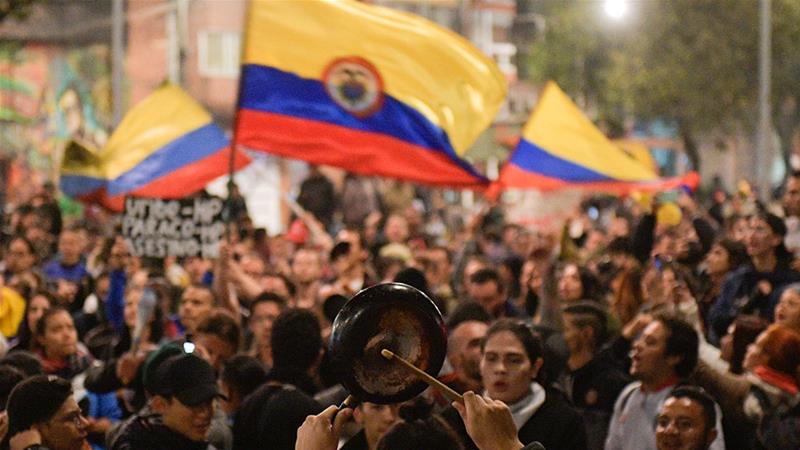 These protestors have borrows techniques used in other protests in Latin America, like posting footage of the protests in social media and banging on pots to make their voices heard. The protests erupted after an 18 year old was hit in the head with a tear gas canister fired by the police and then died in the hospital days later. This led to the strike committee to add the dismantling of the riot police to one of their 13 demands. The turmoil has alarmed investors who fear of a credit rating downgrade in Colombia. The peso has been hit hard over the last couple weeks reaching an all time low of 3,509 against the US dollar.Mr. Duque’s rating has dropped 30% over the last couple of weeks and despite economic growth, unemployment has reached its lowest in over a decade.
These protestors have borrows techniques used in other protests in Latin America, like posting footage of the protests in social media and banging on pots to make their voices heard. The protests erupted after an 18 year old was hit in the head with a tear gas canister fired by the police and then died in the hospital days later. This led to the strike committee to add the dismantling of the riot police to one of their 13 demands. The turmoil has alarmed investors who fear of a credit rating downgrade in Colombia. The peso has been hit hard over the last couple weeks reaching an all time low of 3,509 against the US dollar.Mr. Duque’s rating has dropped 30% over the last couple of weeks and despite economic growth, unemployment has reached its lowest in over a decade.  This article is portrayed columbia fairly good. The article justified the protestors’ actions and blames Columbia’s problems on President Ivan Duque’s actions as president. When comparing Columbia to the rest of Latin America, the article had nothing negative to say about columbia. The article actually states that despite the protests, Columbia is said to be doing a lot better than its neighboring countries. When comparing this article to previous events in Latin America, we can see a clear connection to the “cacerolazo” movement in Chile.
This article is portrayed columbia fairly good. The article justified the protestors’ actions and blames Columbia’s problems on President Ivan Duque’s actions as president. When comparing Columbia to the rest of Latin America, the article had nothing negative to say about columbia. The article actually states that despite the protests, Columbia is said to be doing a lot better than its neighboring countries. When comparing this article to previous events in Latin America, we can see a clear connection to the “cacerolazo” movement in Chile.
Latin American Response to Bolivia’s Political Unrest
Following the right-wing coup in Bolivia and the resignation of Evo Morales, the governments and people of several Latin American countries have let their thoughts and opinions be heard. One of the main countries voicing their opinion is Mexico, which granted Morales political asylum following his coerced resignation by the military in an order to return the country to peace. A Mexican Air Force G550 was sent Monday morning to pick up Morales in a proactive effort, not a reactive effort. There was uneasiness in the journey because the plane took off from Lima, Peru it was not allowed to land in Bolivia and had to return and wait for hours. After Morales was picked up, the plane was not able to refuel in Peru “due to political evaluations.” The plane was then able to land in Paraguay after a discussion between Argentina’s President-elect Alberto Fernandez and Paraguay’s President Mario Abdo. Following his departure, Morales tweeted “Sisters and brothers, I am leaving towards Mexico… It hurts to leave the country for political reasons; however, I will always be watching. Soon I will return with more strength and energy.”
Many left-leaning Latin American governments have expressed their thoughts that this was coup, while right-leaning governments like the US and the UK have expressed this as a return to democracy. Nicaragua’s left-leaning president Daniel Ortega has called this a coup and shows his unwavering support for Morales. Argentina’s foreign minister agrees with the recommendation from the OAS about holding new elections, but its President-elect Alberto Fernandez describes what has been happening a coup, saying “It was a coup perpetrated against the president who had called for a new electoral process”. There have even been huge protests in Buenos Aires against the coup. Venezuela’s Maduro condemned this suspected coup and added his support for the Native Bolivian people who he calls “victims of racism,” while Juan Guaido describes this as a continuation of the “democratic hurricane in Latin America”. Cuba has also called this a coup. Countries with more center and/or right-leaning governments have not called this a coup, but do call for a peaceful transition and process, these countries include Chile, Peru, Colombia, and Brazil.
Latin America as a whole is portrayed differently in all the articles I looked at. It depends on which news site, but these sites seem more or less neutral and just reporting on an event that could be considered a coup or not, which also depends on which government leader people are asking. This is very important to our class discussion because Latin America has a lengthy history of right-wing coups that have taken out democratically elected governments. We are seeing history in the making, and a history that has clearly repeated itself. 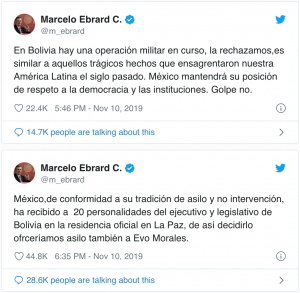
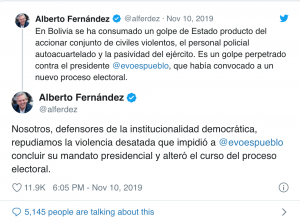
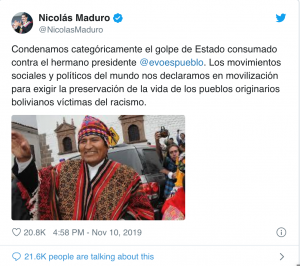
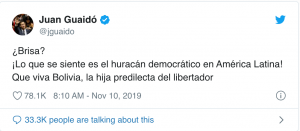
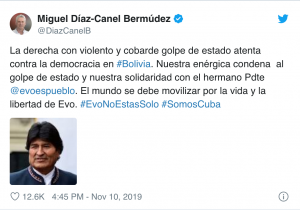
Sources
- https://www.telesurenglish.net/news/Bolivias-Evo-Morales-Lands-In-Mexico-As-A-Political-Refugee-20191112-0005.html
- https://www.aljazeera.com/news/2019/11/mexico-grants-asylum-bolivia-evo-morales-191111232118741.html
- https://www.cnn.com/2019/11/13/americas/bolivia-political-unrest-intl-hnk/index.html
- https://www.telesurenglish.net/news/massive-mobilization-in-buenos-aires-against-coup-in-bolivia-20191112-0021.html
